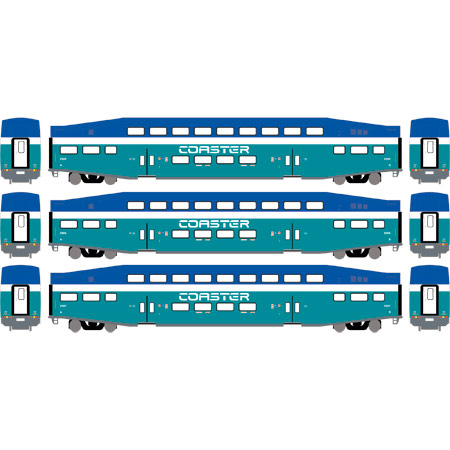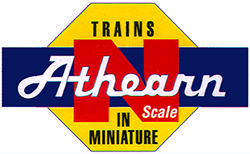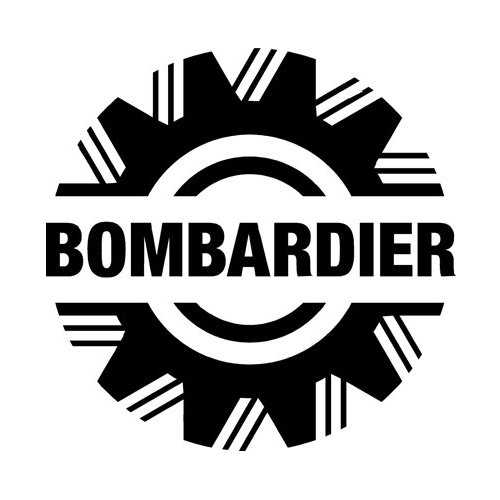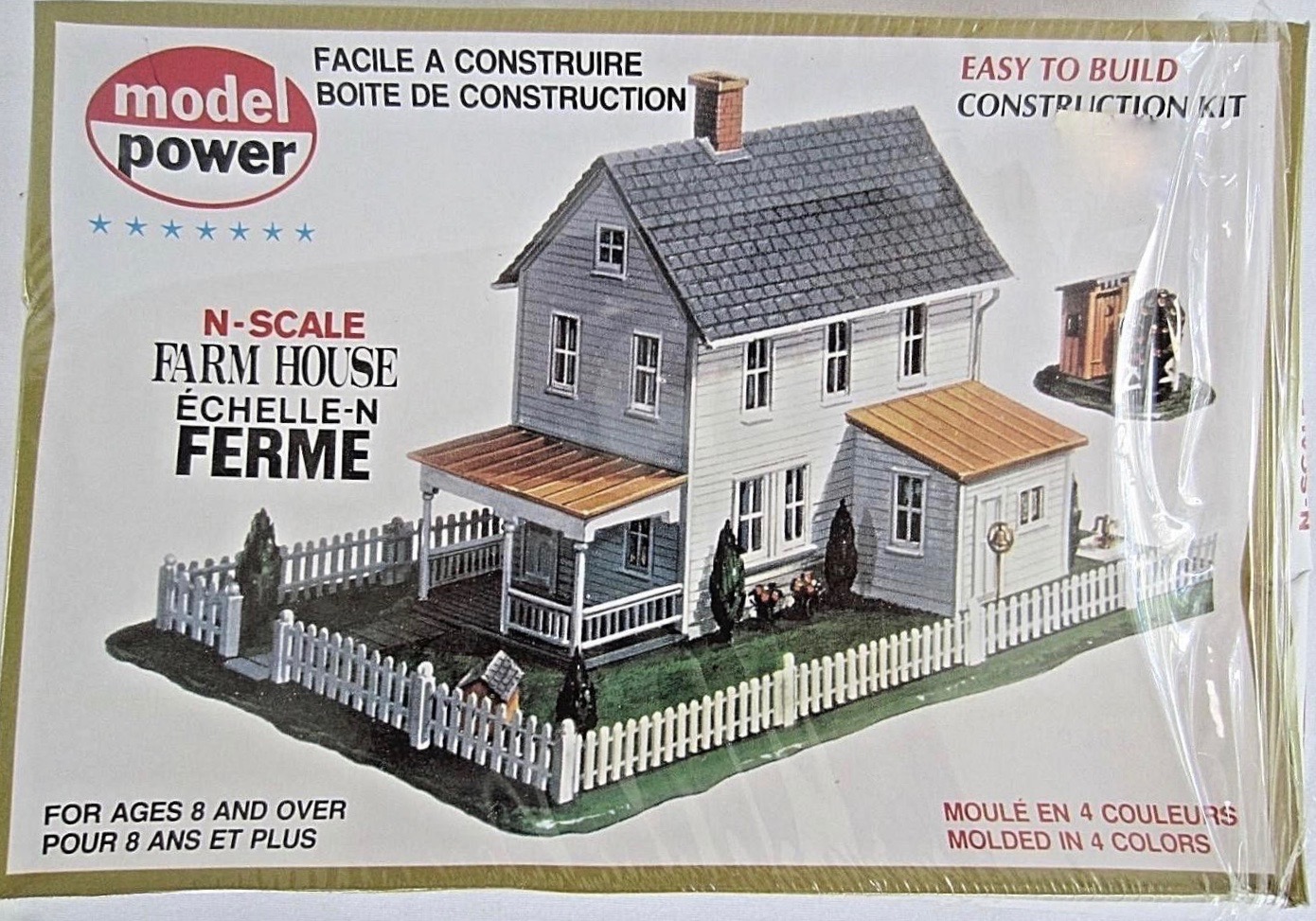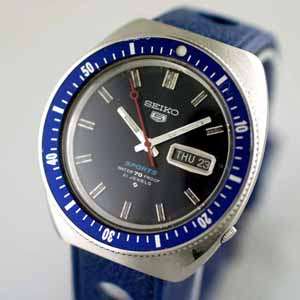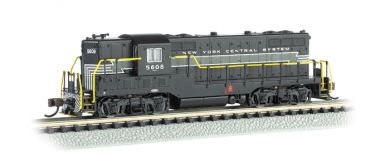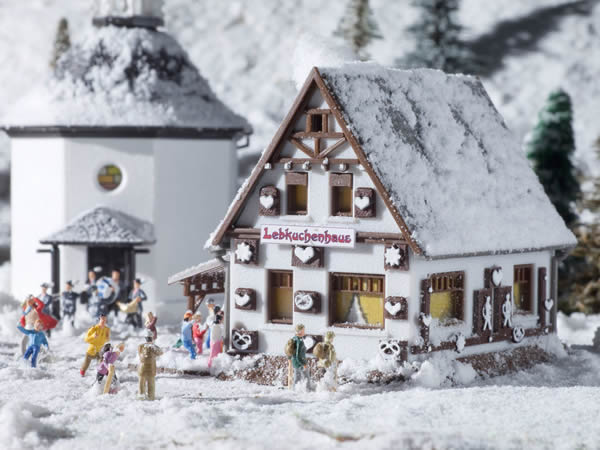Prototype History: The Bombardier MultiLevel Coach is a bi-level passenger rail car manufactured by Bombardier for use on commuter rail lines. It started service in 2006 and is still being produced as of 2012.
The coaches have a two-by-two seating arrangement and more knee and leg room than single level coaches. The seats are also bigger and it has 15-30% more seating than on single level coaches. The intermediate levels have 5 inward-facing flip-up seats on each side, for wheelchairs or bicycles. On cab cars, a large equipment locker behind the cab replaces one row of seats. There are large side doors at intermediate levels, and end doors, except at the cab position on cab cars. The end doors of NJ Transit coaches have stepwell traps, allowing these doors to be used for both high and low-platform loading. AMT coaches have one-piece end doors without traps, which can be used only for low-platform loading. There are also an automated announcement system and LED destination screens.
The coaches have a two-by-two seating arrangement and more knee and leg room than single level coaches. The seats are also bigger and it has 15-30% more seating than on single level coaches. The intermediate levels have 5 inward-facing flip-up seats on each side, for wheelchairs or bicycles. On cab cars, a large equipment locker behind the cab replaces one row of seats. There are large side doors at intermediate levels, and end doors, except at the cab position on cab cars. The end doors of NJ Transit coaches have stepwell traps, allowing these doors to be used for both high and low-platform loading. AMT coaches have one-piece end doors without traps, which can be used only for low-platform loading. There are also an automated announcement system and LED destination screens.
Road Name History: 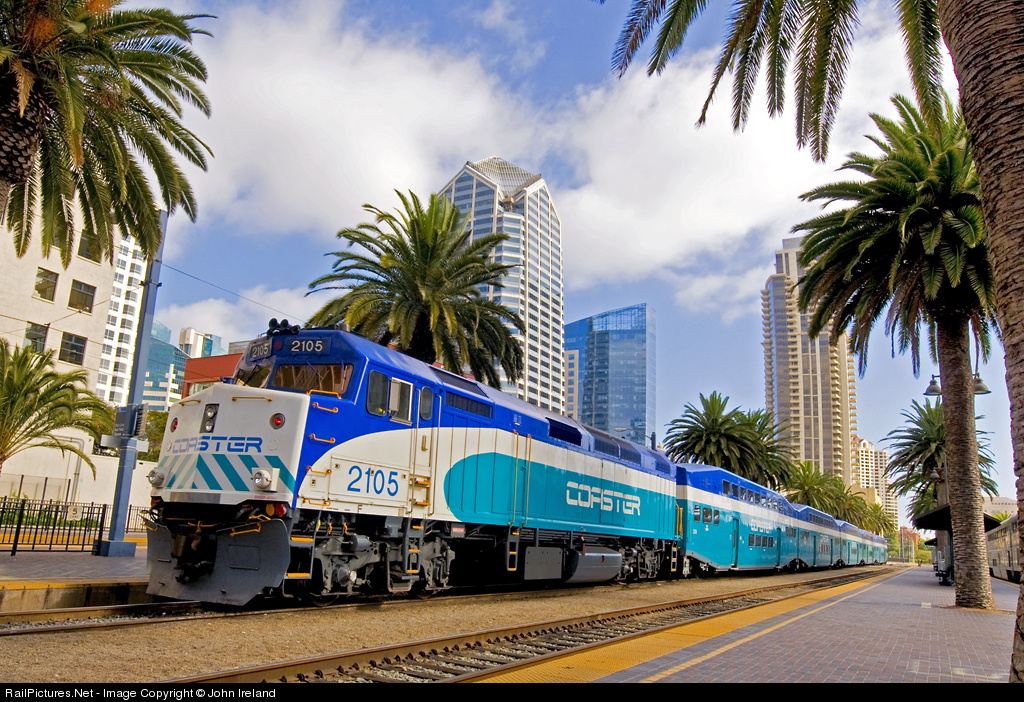 San Diego, California’s Coaster commuter rail operation was launched in 1995 to provide service from San Diego Union Station as far north as Oceanside, 41 miles away. The SDNX fleet included five F40PHM-2C’s and two F59PHI’s but Coaster replaced these with a fleet of nine SC-44 Chargers built by Siemens between 2018 and 2021. The active car fleet as of this writing includes 30 Bombardier-built coaches. They typically run at least 20 trains per day, Monday through Friday. Special trains run for San Diego Padres home games.
San Diego, California’s Coaster commuter rail operation was launched in 1995 to provide service from San Diego Union Station as far north as Oceanside, 41 miles away. The SDNX fleet included five F40PHM-2C’s and two F59PHI’s but Coaster replaced these with a fleet of nine SC-44 Chargers built by Siemens between 2018 and 2021. The active car fleet as of this writing includes 30 Bombardier-built coaches. They typically run at least 20 trains per day, Monday through Friday. Special trains run for San Diego Padres home games.

Brand/Importer Information: Athearn's history began in 1938, when its founder-to-be, Irvin Athearn, started an elaborate O scale layout in his mother's house. After placing an ad selling the layout, and receiving much response to it, Irv decided that selling model railroads would be a good living. He sold train products out of his mother's house through most of the 1940s. After becoming a full-time retailer in 1946, Irv opened a separate facility in Hawthorne, California in 1948, and that same year he branched into HO scale models for the first time.
Athearn acquired the Globe Models product line and improved upon it, introducing a comprehensive array of locomotive, passenger and freight car models. Improvements included all-wheel drive and electrical contact. One innovation was the "Hi-Fi" drive mechanism, employing small rubber bands to transfer motion from the motor spindle to the axles. Another was the double-ended ring magnet motor, which permitted easy connection to all-wheel-drive assemblies. Athearn was also able to incorporate flywheels into double-ended drives.
The company produced a model of the Boston & Maine P4 class Pacific steam locomotive which incorporated a cast zinc alloy base and thermoplastic resin superstructure. It had a worm drive and all power pickup was through the bipolar trucks that carried the tender. This item was discontinued after the Wilson motor was no longer available, and was not redesigned for a more technologically advanced motor.
Athearn's car fleet included shorter-than-scale interpretations of passenger cars of Southern Pacific and Atchison, Topeka & Santa Fe Railroad prototypes. The company also offered a variety of scale-length freight cars with sprung and equalized trucks. The cars could be obtained in simple kit form, or ready-to-run in windowed display boxes. The comprehensive scope of the product line contributed to the popularity of HO as a model railroad scale, due to the ready availability of items and their low cost.
Irv Athearn died in 1991. New owners took control in 1994, but continued to follow Athearn's commitment to high-quality products at reasonable prices. Athearn was bought in 2004 by Horizon Hobby. Athearn was then moved from its facility in Compton to a new facility in Carson, California. In mid-2009, all remaining US production was moved to China and warehousing moved to parent Horizon Hobby. Sales and product development was relocated to a smaller facility in Long Beach, California.
Read more on Wikipedia and Athearn website.
Athearn acquired the Globe Models product line and improved upon it, introducing a comprehensive array of locomotive, passenger and freight car models. Improvements included all-wheel drive and electrical contact. One innovation was the "Hi-Fi" drive mechanism, employing small rubber bands to transfer motion from the motor spindle to the axles. Another was the double-ended ring magnet motor, which permitted easy connection to all-wheel-drive assemblies. Athearn was also able to incorporate flywheels into double-ended drives.
The company produced a model of the Boston & Maine P4 class Pacific steam locomotive which incorporated a cast zinc alloy base and thermoplastic resin superstructure. It had a worm drive and all power pickup was through the bipolar trucks that carried the tender. This item was discontinued after the Wilson motor was no longer available, and was not redesigned for a more technologically advanced motor.
Athearn's car fleet included shorter-than-scale interpretations of passenger cars of Southern Pacific and Atchison, Topeka & Santa Fe Railroad prototypes. The company also offered a variety of scale-length freight cars with sprung and equalized trucks. The cars could be obtained in simple kit form, or ready-to-run in windowed display boxes. The comprehensive scope of the product line contributed to the popularity of HO as a model railroad scale, due to the ready availability of items and their low cost.
Irv Athearn died in 1991. New owners took control in 1994, but continued to follow Athearn's commitment to high-quality products at reasonable prices. Athearn was bought in 2004 by Horizon Hobby. Athearn was then moved from its facility in Compton to a new facility in Carson, California. In mid-2009, all remaining US production was moved to China and warehousing moved to parent Horizon Hobby. Sales and product development was relocated to a smaller facility in Long Beach, California.
Read more on Wikipedia and Athearn website.
Item created by: Lethe on 2016-08-31 07:22:48. Last edited by gdm on 2018-03-13 13:26:55
If you see errors or missing data in this entry, please feel free to log in and edit it. Anyone with a Gmail account can log in instantly.
If you see errors or missing data in this entry, please feel free to log in and edit it. Anyone with a Gmail account can log in instantly.


